
Journal of Hematology
Scope & Guideline
Innovating Insights into Blood Disorders
Introduction
Aims and Scopes
- Clinical Research in Hematological Malignancies:
The journal publishes studies related to various hematological malignancies, including leukemia, lymphoma, and myeloma, focusing on clinical trials, treatment outcomes, and novel therapeutic strategies. - Transfusion Medicine and Hemostasis:
Research on blood transfusion practices, management of bleeding disorders, and the role of hemostatic agents is a core area, addressing both clinical and laboratory aspects. - Genetics and Molecular Biology in Hematology:
The journal emphasizes the genetic and molecular underpinnings of hematological diseases, including studies on mutations, genetic predispositions, and the role of biomarkers in diagnosis and treatment. - Patient-Centered Outcomes and Quality of Life:
An important aim is to evaluate the impact of hematological diseases and their treatments on patients' quality of life, including psychosocial factors and adherence to therapy. - Innovative Therapeutics and Clinical Trials:
The journal highlights cutting-edge therapeutic modalities, including CAR-T cell therapy, monoclonal antibodies, and gene therapies, along with the results of clinical trials and real-world studies. - Epidemiology and Health Disparities:
Research that explores the epidemiological aspects of hematological disorders, including disease prevalence, outcomes across different populations, and health disparities.
Trending and Emerging
- Immunotherapy and CAR-T Cell Therapies:
There is a significant increase in publications focusing on immunotherapy, including CAR-T cell therapies for hematological malignancies, highlighting their rapid development and clinical application. - Real-World Evidence and Patient Registries:
An upward trend in studies utilizing real-world data and patient registries is evident, providing insights into treatment outcomes and effectiveness in diverse populations. - Genomic and Molecular Profiling:
Research focusing on the genomic and molecular characterization of hematological diseases is on the rise, emphasizing the importance of personalized medicine and targeted therapies. - Management of COVID-19 in Hematology Patients:
Emerging studies addressing the impact of COVID-19 on patients with hematological disorders, including vaccination responses and treatment adaptations, are increasingly prevalent. - Health Disparities and Patient-Centered Care:
There is a growing emphasis on understanding health disparities in hematology, with research focusing on social determinants of health and their impact on patient outcomes. - Chronic Conditions and Comorbidities:
An increasing focus on the management of chronic conditions and comorbidities among patients with hematological diseases is evident, particularly in the context of aging populations.
Declining or Waning
- Traditional Chemotherapy Approaches:
There is a noticeable decrease in publications focusing solely on traditional chemotherapy regimens for hematological malignancies as newer targeted therapies and immunotherapies gain prominence. - Basic Hematology Education:
Research articles centered on basic hematology education and training have diminished, possibly due to a shift towards more advanced and specialized topics that incorporate new technologies and treatment modalities. - Longitudinal Studies of Established Treatments:
Fewer studies are being published that focus on long-term outcomes associated with established treatments, as the emphasis shifts towards innovative therapies and their immediate effects. - Hematopathology Techniques:
The publication of studies focused solely on traditional hematopathology techniques has decreased, reflecting a move towards molecular and genetic diagnostics that utilize advanced technologies. - Single-Agent Therapies:
Research specifically on single-agent therapies is declining in favor of studies on combination therapies and novel treatment strategies that show improved efficacy.
Similar Journals
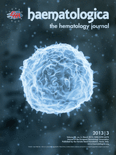
HAEMATOLOGICA
Leading the Way in Hematological InnovationHAEMATOLOGICA, published by FERRATA STORTI FOUNDATION, is a prestigious journal in the field of hematology, recognized for its high impact and contribution to advancing research in this critical area of medicine. With an impressive Q1 ranking in the 2023 category of Hematology and a notable Scopus rank of #12 out of 137, the journal serves as an essential platform for disseminating innovative studies, clinical trials, and comprehensive reviews from 1947 to 2024. Based in Italy, with a commitment to quality and academic integrity, HAEMATOLOGICA fosters collaboration among researchers, practitioners, and students interested in the latest developments and methodologies within hematological science. Although it does not offer open access, the journal ensures that valuable insights are accessible through institutional subscriptions, emphasizing its role in shaping the future of hematologic research.

UHOD-Uluslararasi Hematoloji-Onkoloji Dergisi
Bridging gaps in hematology and oncology scholarship.UHOD-Uluslararasi Hematoloji-Onkoloji Dergisi, published by AKAD DOKTORLAR YAYINEVI, is a pivotal journal in the fields of hematology and oncology, catering to an international audience of researchers, clinicians, and students. Since its inception in 2005, the journal has committed to disseminating high-quality, peer-reviewed research, highlighting advancements and challenges in the diagnosis and treatment of hematological and oncological disorders. Registered under ISSN 1306-133X, it serves as a significant platform for scholarly discourse, despite its recent categorization in the Q4 quartile for both hematology and oncology—indicating opportunities for growth and contribution within the scientific community. While currently not Open Access, the journal's indexed contribution to Scopus ranks it within the 12th and 17th percentiles in the domains of hematology and oncology respectively, reflecting its emerging presence within the academic landscape. As it approaches its convergence point in 2024, UHOD strives to elevate its influence, providing invaluable insights and fostering collaborations in the ongoing fight against blood disorders and cancer.

HemaSphere
Empowering innovation in blood science research.HemaSphere, published by WILEY, stands at the forefront of hematology research, offering a vital platform for the dissemination of cutting-edge findings in the field. Since its inception in 2017 and official transition to Open Access in 2018, the journal has positioned itself as a leading conduit for high-impact research, maintaining a prestigious Q1 quartile ranking in the Hematology category as of 2023. Addressed in the United States at 111 River St, Hoboken, NJ, HemaSphere aims to foster a global dialogue among researchers, clinicians, and students by providing unrestricted access to high-quality content that encompasses clinical and experimental advancements. With an array of engaging articles, reviews, and commentaries, HemaSphere contributes significantly to the advancement of hematology, ensuring that critical knowledge is readily accessible to enhance patient care and innovative research. To explore the latest developments and breakthroughs in this dynamic field, we invite scholars, professionals, and students to engage with HemaSphere and elevate their understanding of hematologic science.
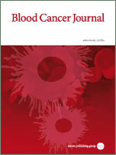
Blood Cancer Journal
Championing accessible research for global impact.Blood Cancer Journal, published by SPRINGERNATURE, is a leading open-access journal that has been at the forefront of hematology and oncology research since its inception in 2011. With an impressive impact factor and a commitment to disseminating high-quality research, it holds a prestigious Q1 ranking in both hematology and oncology categories as of 2023. The journal is dedicated to publishing innovative studies, comprehensive reviews, and insightful commentaries that advance our understanding of blood cancers, making it an essential resource for researchers, healthcare professionals, and students in the field. Its open-access model ensures that groundbreaking research is accessible to a global audience, promoting collaborative efforts to enhance treatment methodologies and patient outcomes. With a strong reputation illustrated by its Scopus rankings—8th in hematology and 30th in oncology—Blood Cancer Journal exemplifies excellence and leadership in the ever-evolving landscape of cancer research.
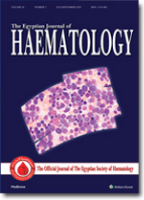
Egyptian Journal of Haematology
Exploring Breakthroughs in Blood Health and DiseaseThe Egyptian Journal of Haematology, published by WOLTERS KLUWER MEDKNOW PUBLICATIONS, stands as a pivotal resource in the field of hematology, particularly within the context of Egypt and the broader Middle Eastern region. This journal is dedicated to disseminating high-quality research that explores the latest advancements in blood disorders, hematologic malignancies, and transfusion medicine. With a focus on original research, case studies, and reviews, it aims to provide a comprehensive platform for hematologists, researchers, and healthcare professionals to enhance their understanding and management of hematological conditions. Although it is not an open-access journal, the rigorous peer-review process ensures that only the most impactful studies are published, contributing to the journal's reputation in the academic community. The Egyptian Journal of Haematology serves as an essential tool for advancing knowledge, improving clinical outcomes, and fostering collaboration among experts in the field.

Journal of Blood Medicine
Exploring Frontiers: Where Blood Medicine Meets Cutting-edge ScienceThe Journal of Blood Medicine, published by DOVE MEDICAL PRESS LTD, stands as a vital resource in the field of hematology, focusing on the latest research developments and clinical advancements in blood medicine. With an impact factor reflective of its growing relevance, this open-access journal has been delivering quality scholarly work since 2010, ensuring that critical research is readily available to the global scientific community. The journal operates under an open-access model, further enhancing its dissemination and accessibility to researchers, professionals, and students alike. In the 2023 rankings, it secured a Q3 category status within hematology and achieved a commendable 76th rank out of 137 in Scopus listings, indicating its commitment to quality and innovation in this specialized area. Located in New Zealand, the journal's diverse topics encompass clinical research, treatment modalities, and emerging therapies, contributing significant insights vital for shaping future advancements in blood medicine.
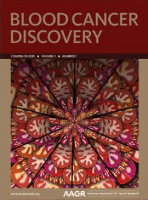
Blood Cancer Discovery
Fostering a Global Dialogue on Hematologic AdvancementsBlood Cancer Discovery is a premier academic journal published by the American Association for Cancer Research, dedicated to advancing the understanding of hematologic malignancies through cutting-edge research in the fields of oncology, biochemistry, and molecular biology. With an impressive impact factor and recognition as a Q1 journal across multiple disciplines, including cancer research and hematology, Blood Cancer Discovery serves as an essential platform for scholars and practitioners alike, facilitating impactful discourse and dissemination of pioneering findings. This open-access journal, established within the vibrant academic landscape of the United States, aims to bridge gaps in research and foster collaborations to ultimately enhance patient outcomes. Its Scopus rankings demonstrate its vital role in the critical advancement of cancer research and therapeutic development. By inviting contributions from a diverse range of disciplines, Blood Cancer Discovery is poised to drive innovation and inspire future advancements in understanding blood cancers.
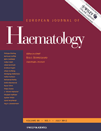
EUROPEAN JOURNAL OF HAEMATOLOGY
Exploring the Frontiers of Hematological ScienceEUROPEAN JOURNAL OF HAEMATOLOGY, published by Wiley, serves as a vital resource for experts in the field of hematology, focusing on the latest advancements in blood disorders and therapies. With an ISSN of 0902-4441 and an E-ISSN of 1600-0609, this esteemed journal has been disseminating knowledge since 1986 and continues to thrive, converging its visionary approach through to 2024. Notably, it holds a distinguished Q2 ranking in Hematology and an impressive Q1 ranking in the broader category of Medicine (miscellaneous) as of 2023, highlighting its significant contribution to the scientific community. With a Scopus rank of #45/137 and a 67th percentile in the field, the journal is recognized for its rigorous peer-reviewed research, making it an indispensable publication for researchers, practitioners, and students aiming to stay at the forefront of hematological studies. Though not an open-access journal, it ensures broad accessibility to critical findings via its subscription model, thus fostering an informed and globally engaged audience.
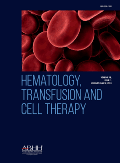
Hematology Transfusion and Cell Therapy
Elevating standards in cell therapy and transfusion science.Hematology Transfusion and Cell Therapy, published by Elsevier, is a leading Open Access journal dedicated to advancing the fields of hematology, immunology, and transfusion medicine. Since its establishment in 2018, this journal has provided a vital platform for sharing innovative research and clinical advancements in the management of blood disorders and cellular therapies. Based in Brazil, it attracts a global audience, facilitating access to high-quality research that influences clinical practice and policy. With a current impact factor that places it in the Q3 category for both hematology and immunology as of 2023, the journal is recognized for its rigorous peer-review process and commitment to disseminating significant findings. By featuring a diverse range of articles, from original research to reviews, Hematology Transfusion and Cell Therapy aims to foster collaboration and knowledge sharing among researchers, professionals, and students alike, empowering them to tackle emerging challenges in their fields.
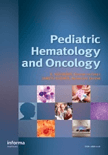
PEDIATRIC HEMATOLOGY AND ONCOLOGY
Transforming pediatric care with expert insights and research.Pediatric Hematology and Oncology, published by Taylor & Francis Inc, serves as a vital platform dedicated to the fields of hematology, oncology, and pediatrics, providing a comprehensive avenue for the dissemination of scholarly research and clinical advancements. With an ISSN of 0888-0018 and an E-ISSN of 1521-0669, this journal has successfully converged its expertise over the years from 1984 to 2024. Ranked in the Q3 category for Hematology and Oncology, alongside a Q2 ranking in Pediatrics, Perinatology, and Child Health (2023), it engages a diverse readership comprising researchers, healthcare professionals, and students eager to explore groundbreaking studies in child health and treatment methodologies. While it currently does not offer Open Access options, the journal is widely cited and recognized, particularly in its specialized fields, fostering a rich environment for dialogue and innovation in the management of pediatric hematological and oncological disorders. The journal is based in the United Kingdom at 530 Walnut Street, Ste 850, Philadelphia, PA 19106, making it an essential resource for those pursuing excellence in pediatric medical research.